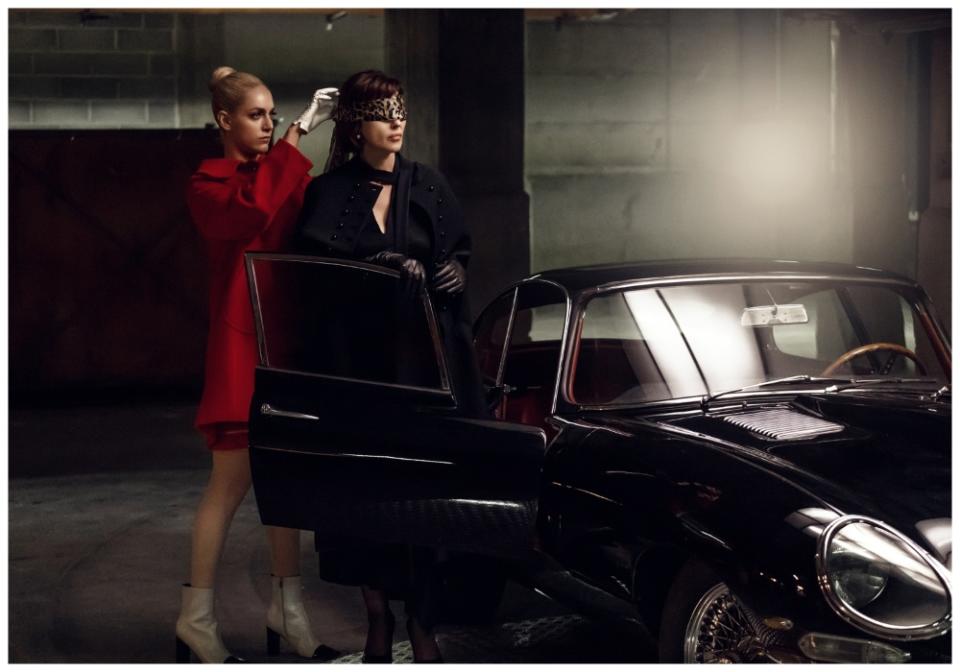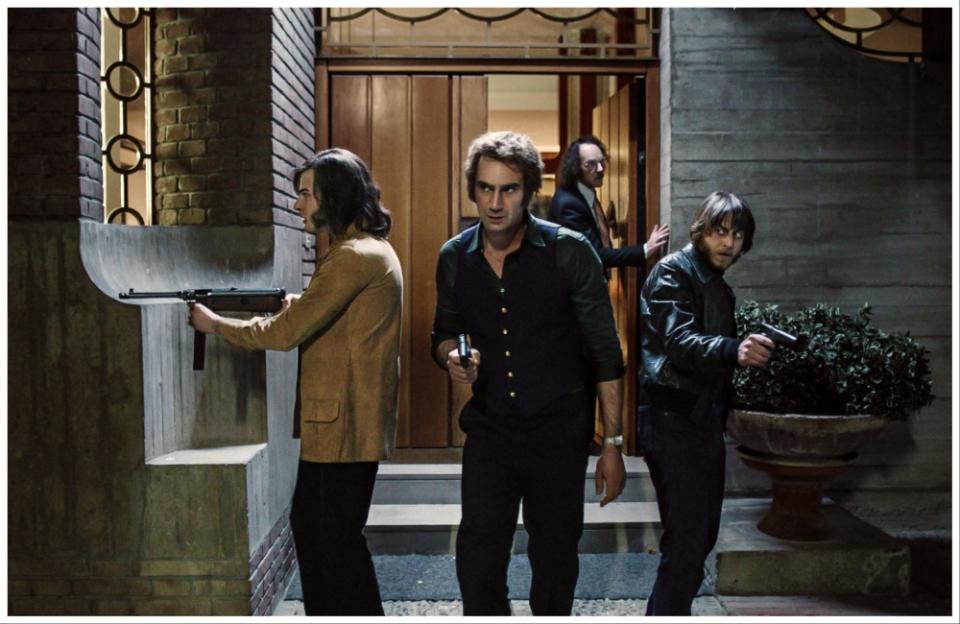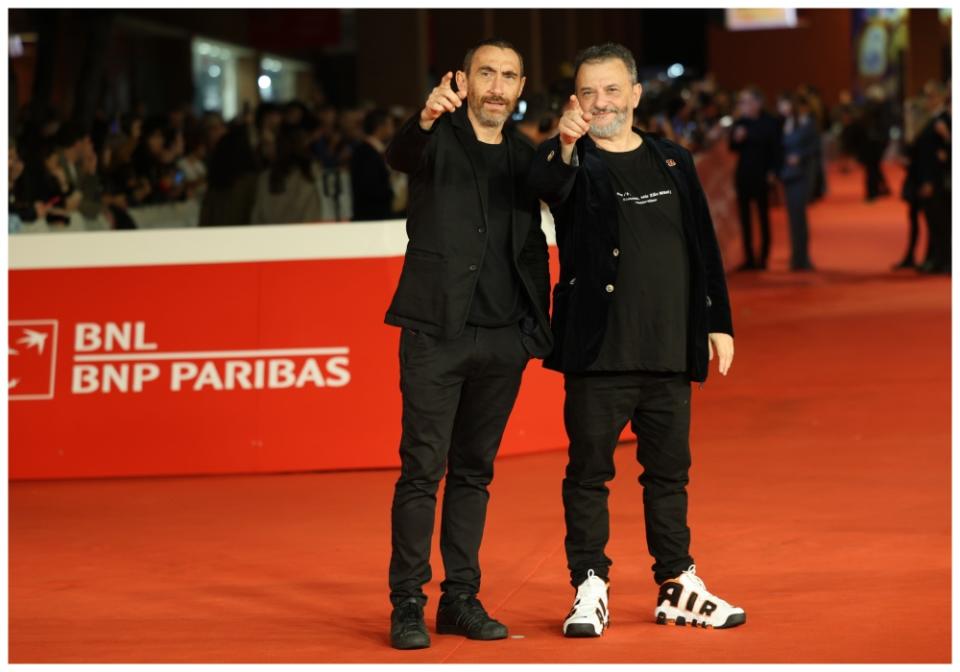‘Diabolik’ Franchise Directors, the Manetti Brothers, on Why We Side With the Master Criminal: ‘He Pushes You to Be Free’ (EXCLUSIVE)
- Oops!Something went wrong.Please try again later.
- Oops!Something went wrong.Please try again later.
- Oops!Something went wrong.Please try again later.
- Oops!Something went wrong.Please try again later.

“Diabolik – Who Are You,” which has its market premiere this week at AFM, following its world premiere at the Rome Film Festival, is the third in a series of adaptations of an Italian comic-book franchise. The books, written by sisters Angela and Luciana Giussani, have sold more than 150 million copies.
Kino Lorber has picked up U.S. rights for all three instalments of the stylish crime-comic movies, written and directed by brothers Marco and Antonio Manetti. Beta Cinema is handling world sales for the films. International buyers for the third film so far include Metropolitan Film in France, Spain’s Flins & Piniculas, Plaion Pictures in German-speaking territories, and Discovery Film in the former Yugoslavia. 01 Distribution is releasing the pic in Italy on Nov. 30.
More from Variety
The franchise centers on Diabolik, an ingenious gentleman thief, living in the fictional city of Clerville in the 1960s and 1970s. Luca Marinelli played the master criminal in the first film, “Diabolik.” “Grey’s Anatomy” actor Giacomo Gianniotti stars as Diabolik in the latter two, “Diabolik – Ginko Attacks!” and “Diabolik – Who Are You.” Also in the cast are Miriam Leone as Eva Kant, Diabolik’s accomplice, Monica Bellucci, in the role of Altea, and Valerio Mastandrea as Inspector Ginko.
The Manetti brothers were transfixed by the books from an early age, they tell Variety. Marco, the older of the two, was at elementary school when he discovered “Diabolik,” even though the books were written for adults. “We come from a very liberal family,” he explains. “For years, it was our goal to adapt these comic-books,” he adds.
While they waited, they witnessed a succession of other filmmakers attempt their own adaptations, including Mario Bava in 1968 with “Danger: Diabolik,” starring U.S. actor John Phillip Law and produced by Dino De Laurentiis. “As comic-book fans, we were a bit disappointed when we saw the Mario Bava movie,” he says. “Now that we’re adults, we think that that movie is a masterpiece in its own way, but it was totally unfaithful to the comic-books. Mario Bava didn’t give a damn – he just made another type of movie. I think he wanted to make a sort of Italian version of James Bond. So, we were a bit disappointed, and we always planned to make the faithful version of the comic-books.”
Other filmmakers followed but, Marco says: “They all tried, and they all failed, and we were convinced that we had the right recipe to make it.” Their chance came in 2018 after their film “Love and Bullets” won Best Film at the David di Donatello Awards, Italy’s top film prize. “We said: ‘With great power comes great responsibility,’ like it says in ‘Spider-Man,’ and we said that that was the time that we have to use that power to try and fulfil this dream,” Marco says.
The brothers contacted the publisher of the comic-books to seek permission, but he had already turned down numerous suitors, and said it would be difficult to persuade him. The brothers persisted and sent a five-page pitch to outline their vision for the adaptations. “After two or three hours the publisher phoned back to say: ‘For 30 years I’ve been waiting exactly for these pages.’ And from then, everything was easy,” Marco says.

Their determination to be faithful to the vintage look of the books, and their noir style, was central to their success in convincing the publisher, Antonio says. Marco explains that their main source of inspiration is Alfred Hitchcock. “Whenever we don’t know how to shoot a scene, we look at each other and say, ‘How would the master do it?'” The other filmmakers who “made us fall in love with cinema,” he says, were Steven Spielberg, John Carpenter and Dario Argento.
Marco explains the look of the films. “It is Italy – very Italian – but Italy without the antiquity, as if Italy was founded at the beginning of the last century. It is the north of Italy without a past. So, it’s quite a bit colder and more geometric than Italy is. But it’s still very Italian because we use architecture from the fascist architecture of the 20s to the brutal architecture of the 60s that are very Italian.” The furniture, Antonio adds, is all true to designs of the 1960s and 1970s. Set design is by Noemi Marchica, and costume design by Ginevra De Carolis. Ninety percent of “Diabolik – Who Are You” was shot in the North of Italy, Marco says, divided between a studio in Bologna, for interiors, and Milan and Trieste, for exteriors. One sequence, a flashback to Diabolik’s childhood, was shot in Calabria, in the South of Italy.
The character of Diabolik himself is very important. “It’s a complicated and simple character at the same time,” says Marco. “He is a very dark and fascinating character.” The stories tap into fundamental human preoccupations. “All the stories deal with love and death, which are definitely the most interesting things in the world,” he says. “However, when we started studying [the stories] more to make the [first] movie, we realized that there was something more to it. We realized that this character is a metaphor for freedom. That’s what makes you stay on his side. He is a killer and a thief. So why do you stay on the side of a killer and a thief? Because in a symbolic way it doesn’t really push you to steal or kill. But it pushes you to be free. He fights for his freedom.”
There is something particularly Italian in the ambiguity of the films’ depiction of good and evil. It’s not black and white. There’s a complexity and subtlety to it. “I think that this is what Italian cinema has lost in the past 20 years,” Marco says. “We had always been specialists in the controversial. It is a characteristic of our culture and I think in this moment Italy has lost that touch and we became a little flat in that sense.
“For us, the American were the protagonists of black and white, good and evil. Now they have become more controversial than us. Today, American film is more controversial than Italian film, and we find that unbearable because we lost what we are famous for.

“So, yes, I think that this apparent immorality, that makes reality a little bit more complex, is very Italian.”
Antonio adds that this point explains why the previous adaptations of “Diabolik” failed: the filmmakers couldn’t accept that you could be on the side of a killer and a thief, so they tried to avoid the controversial nature of his appeal, and “make him into a kind of Robin Hood character, or something strange, like an alien.” In those films, “they tried to give him a traumatic backstory,” adds Marco, “to justify why he steals, and try to stop him from killing.” However, in “Diabolik – Who Are You” the backstory is as it was in the books. “He remains dark,” Marco says.
He adds that Diabolik has a “very feminine side,” perhaps reflecting the fact that the original stories were written by two women, and that the stories acquired their distinctive feel after the introduction of the Eva Kant as a co-protagonist. “This is where the women writers brought the women’s inside story,” he says.
The four main protagonists in this latest film are “very strong and very clever,” he says. “Their choices show their originality and their intelligence. But the difference is that the women know how to put their intelligence at the service of the heart. There is no point being a genius if you don’t use that genius for something that is in your heart, and Diabolik’s heart is cold, and Ginko’s heart is constrained by society. But Altea and Eva are free from that. They are free to love.”
Now, the brothers are editing “U.S. Palmese,” their comedy about an Italian soccer club, which they shot in the summer. It centers on a talented but troublesome soccer player, who nobody wants to employ in a professional team anymore. To salvage his reputation, he goes to play for an amateur team in the South of Italy. It is set in Palmi, a town in Calabria, where the brothers’ mother comes from. 01 Distribution will release the film in Italy.
The brothers, in the past, were approached by Hollywood studios to remake some of their films, which they rejected. Antonio explains that their films are personal, and they write about people and places they know, so to transplant those stories to another culture would be difficult. However, they would be tempted to work on something original for a Hollywood studio, especially given that they were “more formed by Hollywood movies than Italian movies,” Marco says. That said, they have been warned that “Hollywood takes out your soul. I don’t think that it’s always like that, but I’ve seen that sometimes it’s like that.”

He adds: “We would like to find a Hollywood project that is popular but lets us maintain our soul. Not because we want to be auteurs, but because we are convinced that our talent is limited to what we feel. And so, we don’t want to get lost in something that we don’t really feel. I don’t know exactly what type of movie it would be but we should approach it in a very delicate way. “
The brothers do not rule out returning to the “Diabolik” franchise, either as directors or producers with another director. “Right now, we want to rest a bit from the dark side and go on to something else, but who knows? Why not? Either us or anybody else. Because ‘Diabolik’ is more than Manetti Bros. It is a very important Italian character,” Antonio says.
Best of Variety
Sign up for Variety’s Newsletter. For the latest news, follow us on Facebook, Twitter, and Instagram.

